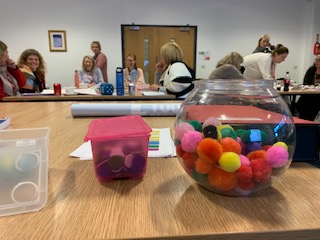
All dates to attend include
14 March, 18 April, 23 May and 27 June 2024
Same timings all sessions
Darlington venue
PLEASE NOTE YOU NEED TO PROVIDE YOUR TEACHER REFERENCE NUMBER (TRN)
*Schools who have already participated in Pathway 1 can take part in Pathway 2.
*Schools who have not experienced an EY work group can participate in either pathway; the order is not important.
*Participants must be able to commit fully to the Work Group, including the completion of classroom activities/gap tasks in between sessions. Each participant is required to attend all 4 sessions.
‘Early Years settings and schools should invest in developing practitioners’ own understanding of mathematics, their understanding of how children typically learn, and how this relates to effective pedagogy.’ – EEF KS1 Guidance Report
It has long been recognised that maths teaching is enhanced when the teachers are confident about the subject matter. Shulman (1986) and Ball (2008) identified specialist knowledge that teachers of maths uniquely need. We view specialist knowledge as a blend of subject knowledge and pedagogical knowledge.
This programme supports Early Years practitioners to develop specialist knowledge for teaching maths, building on the EYFS statutory framework to develop distinct pedagogical decision-making which impacts on classroom practice.
The EY SKTM Programme consists of the equivalent of 4 days, spread out over a minimum of 2 terms, to allow participants time to develop practice and evaluate the impact of adaptations made. Professional learning and practice development continue throughout the period of the programme, with participants implementing new ideas into their daily practice.
There are two SKTM Early Years pathways:
- Pathway One: Number Patterns and Structures
- Pathway Two: Pattern, Shape, Space and Measures - Key content – Pattern, Spatial Reasoning, Measures
Pedagogy - Stories, Songs & Rhymes, Developing Language and The Learning Environment
Participants should participate in only one pathway in any one year – the order does not matter. Each pathway has three core maths session, three core pedagogy sessions, and a task to support the transition from theory to practice. In a final core module, participants review the quality of provision and how this supports a teaching for mastery approach.
This project is for Early Years teachers who would like to develop their specialist knowledge for teaching maths to Reception pupils. It may be particularly relevant for teachers that have moved phases or teachers that have not received maths-specific training.
What are the intended outcomes of this project?
Pupil outcomes
Pupils will:
• be able to communicate their maths and mathematical thinking through graphical representations and/or appropriate language
• use mathematical vocabulary and thinking in everyday activities
• demonstrate a positive attitude towards maths, being willing to have a go, persevere, and share their mathematical ideas.
Practice development
Participants will:
• explore and increase their use of a range of pedagogic approaches that will support pupils in engaging with and developing their maths
• increase their confidence in enhancing opportunities for mathematical learning in all areas of provision
• model the use of mathematical language and thinking as part of everyday activities in the setting.
Professional learning
Participants will:
• demonstrate enhanced maths subject knowledge using developmental learning trajectories to assess and plan for sequential leaning opportunities
• understand how maths opportunities can be developed across all areas and in everyday routines.
.jpg)